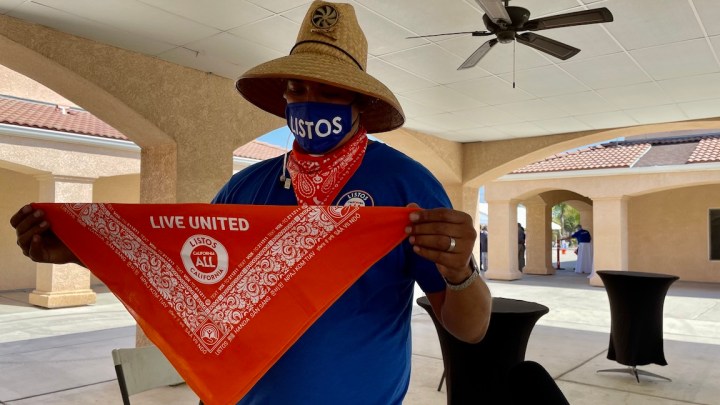
Music, food and myth-busting bring vaccines to hesitant farmworkers
Music, food and myth-busting bring vaccines to hesitant farmworkers

There’s been a lot of talk about essential workers during this pandemic, from restaurant workers preparing our takeout to the people keeping grocery stores humming or the electricity flowing in our home offices.
There is also growing concern about the folks who grow our food: farmworkers. Health officials say they’ve been hit hard, since many live and work in cramped conditions. At least 1 in 3 farmworkers in California have COVID-19 antibodies, meaning they have already been infected, said Elizabeth Strater from United Farm Workers.
With vaccinations well underway elsewhere in the country, there’s a concerted effort now to get farmworkers vaccinated as well, but that requires a unique approach in the face of several challenges.
That’s playing out in Selma, a relatively small town in California’s agriculture-dominant Central Valley. The farms here mostly grow grapes that will be turned into raisins. There’s a shopping center off a state highway and a Sikh temple serving the area’s Punjabi immigrant community.
On this day, the temple’s vast grounds are repurposed as a food aid distribution and vaccination site. It’s for agricultural workers. The majority of them are Latino.

There’s Spanish-language music blaring and a now-familiar site of cars lining up for vaccinations.
“These are the folks that have, over the last year of this pandemic, have pretty much borne the brunt of this COVID-19,” said Rico Peralta with the United Way of Fresno and Madera Counties, which is co-sponsoring the vaccination drive.
Based on statistics gathered by Purdue University, as much as 18% of the U.S. agricultural and farmworker population has tested positive for COVID-19. That’s compared to 5% of the general population nationwide.
“I’m really proud of the work that we’re doing to try and stand up these mass vaccination events that are going to address inequity, in terms of folks getting appointments,” Peralta said,
Officials say that inequity for farmworkers is the result of many factors, including language barriers, lack of regular access to primary health care, especially if they’re undocumented, and even lack of internet access in rural areas.
Another hurdle is vaccine misinformation. There is a lot of that here, according to Trinidad Solis, a physician with the Fresno County Department of Public Health, which serves some 70,000 farmworkers.
“There’s several myths that are circulating in our community, some of them being that perhaps the vaccines can integrate into our DNA or that there’s a microchip in them,” she said.
Local officials say undocumented workers are particularly worried about the microchip rumor, fearing that they will be tracked and deported. Of course, that’s not true.
Another person combating those dangerous rumors is Ricardo Castorena. He’s also the source of the lively music blasting from a colorful van at the vaccination drive. Castorena, a former educator, is a roving DJ with a popular radio station here called Radio Lazer.
His job is to do outreach with farmworkers, and he knows all about the myths that scare people here.
“So I’ve heard lots of little stories,” he said. “I’ve heard that, you know, the vaccine has glass in it. You name it, I have heard it. And my job is to convince people otherwise.”

Castorena travels farm to farm to do his convincing. The popular music attracts the farmworkers while he takes the opportunity to tell them about vaccination events nearby.
“I told them, if you get vaccinated, I’m gonna throw your farm a carne asada party,” Castorena said. “So now, I had to go have a carne asada party in the middle of a field, which I’ve done many times. But there’s always these funny ways to convince them, right? Because we’re, in our culture, la fiesta is everything,”
Public health officials know this kind of culturally sensitive and personal outreach can work. They point to Bertha Garnica, who got vaccinated at the Selma event. She was initially skeptical, as she explained through her face mask.
“My husband and I, at the beginning, we didn’t believe in the vaccine. I was worried about it. What if the, my blood changes? What if I get cancer in the future? You know, those things,” she said.
But at the music and food event, local health experts chatted with Garnica. They showed her how the vaccines work and convinced her they were safe.
She also considered what would happen in the upcoming summer months in the blazing heat in California’s Central Valley.
“And imagine having the mask and be working at the fields with this weather coming up. It’s going to be very hard. So I said, ‘It’s time for me to get my vaccine, because the weather is going to get very hot, and with the mask on, I don’t think I’m going to make it,” she said.
Garnica was relatively easy to convince, but others may not be. Public health experts say they know they’ll soon be left with people who are more reticent. So here in California’s agricultural heartland, they’re preparing to ramp up their vaccination efforts, officials say, planning to go door to door if they have to.

There’s a lot happening in the world. Through it all, Marketplace is here for you.
You rely on Marketplace to break down the world’s events and tell you how it affects you in a fact-based, approachable way. We rely on your financial support to keep making that possible.
Your donation today powers the independent journalism that you rely on. For just $5/month, you can help sustain Marketplace so we can keep reporting on the things that matter to you.


















